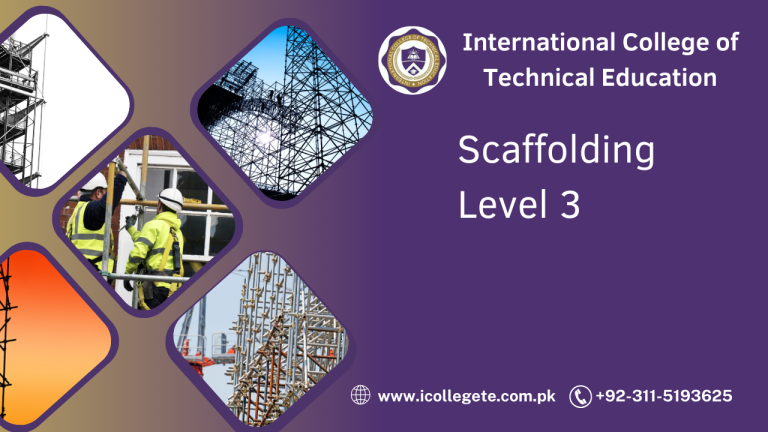Environmental Engineering is an essential field that combines principles from engineering, chemistry, biology, and environmental science to develop solutions that mitigate environmental challenges and promote sustainability. The Environmental Engineering Course in Lahore equips individuals with the knowledge and skills necessary to tackle pressing environmental issues, including pollution control, waste management, and sustainable infrastructure development.
The Environmental Engineering Course in Lahore is a specialized training program aimed at educating participants on the fundamental principles and advanced practices in environmental protection and management. The course focuses on environmental systems, sustainability, pollution control, waste management, and regulatory compliance, preparing individuals to play a crucial role in addressing environmental concerns. Participants will gain hands-on experience and theoretical knowledge in areas such as water treatment, air quality management, solid waste disposal, and environmental impact assessments.
Environmental engineers are at the forefront of developing solutions to combat the effects of climate change, air and water pollution, and environmental degradation. By taking this course, individuals will be empowered to make impactful contributions to both public and private sectors, focusing on environmental preservation and sustainable development.
Course Overview
The Environmental Engineering Course in Lahore provides participants with a thorough understanding of environmental engineering concepts and their application in real-world scenarios. The course is structured to offer a blend of theoretical knowledge and practical skills, ensuring that participants are prepared to tackle complex environmental challenges in various industries, such as construction, manufacturing, and public policy.
The course curriculum includes studies in water and wastewater treatment, air quality control, environmental laws, and sustainable design. By integrating both theoretical and applied learning, the course prepares students for careers in environmental consulting, environmental management, or government agencies focused on environmental protection and sustainability.
Study Units
The Environmental Engineering Course typically includes the following key study units:
- Introduction to Environmental Engineering: Overview of the role of environmental engineers in promoting sustainability and addressing environmental issues. Topics include pollution, climate change, and waste management.
- Water and Wastewater Treatment: Study of the methods and technologies used to treat water for consumption and manage wastewater. Participants will learn about filtration, disinfection, and biological treatment processes.
- Air Quality Management: Techniques for monitoring and controlling air pollution. Topics include air pollutants, environmental regulations, and air quality improvement methods.
- Solid and Hazardous Waste Management: Best practices for handling, recycling, and disposing of waste. Focus on reducing waste production, enhancing recycling processes, and dealing with hazardous materials.
- Environmental Impact Assessment (EIA): Learning how to evaluate the potential environmental impacts of a project or development. Includes risk assessments, mitigation strategies, and sustainability practices.
- Sustainable Development and Green Engineering: The principles of sustainable design and engineering practices that aim to reduce the environmental impact of construction and industrial processes.
- Environmental Laws and Regulations: Overview of local and international environmental laws, policies, and regulations governing environmental protection and public health.
- Pollution Control Technologies: In-depth study of various pollution control methods, such as scrubbers, filters, and waste treatment systems for mitigating environmental damage.
- Environmental Chemistry and Biology: Understanding the chemical and biological processes that influence environmental systems, including the effects of pollutants on ecosystems and human health.
- Renewable Energy and Sustainable Resources: Study of renewable energy sources, such as solar, wind, and bioenergy, and how they can be integrated into sustainable engineering practices.
- Climate Change and Global Warming: Understanding the science behind climate change and global warming, and how engineers can help reduce emissions and create adaptive solutions.
Learning Outcomes
Upon completing the Environmental Engineering Course, participants will be able to:
- Understand the fundamental concepts of environmental engineering and their applications in real-world environmental issues.
- Design, implement, and manage water and wastewater treatment systems.
- Assess and manage air pollution, developing strategies to improve air quality.
- Implement solid and hazardous waste management strategies that promote sustainability and compliance with environmental laws.
- Conduct environmental impact assessments and recommend solutions to mitigate adverse effects of construction and industrial projects.
- Understand and apply environmental laws and regulations to ensure that projects are environmentally compliant.
- Design sustainable engineering solutions that contribute to environmental protection and energy efficiency.
- Understand the principles of renewable energy and integrate them into engineering projects to promote sustainability.
- Apply scientific principles to assess and mitigate the effects of climate change and global warming.
Course Benefits
The Environmental Engineering Course offers numerous benefits, including:
- Comprehensive Knowledge: Participants will gain a thorough understanding of environmental engineering principles and their practical applications.
- Hands-On Experience: The course includes practical assignments and case studies that allow participants to apply their learning to real-world scenarios.
- Expert Instructors: The course is taught by experienced environmental engineers and industry professionals who provide valuable insights and guidance.
- Industry Relevance: The course curriculum is aligned with current environmental challenges and regulations, ensuring that participants are well-equipped to address modern environmental issues.
- Career Opportunities: Graduates of this course are well-positioned to pursue careers in environmental engineering, sustainability consulting, government agencies, and industries focused on environmental protection.
- Contribution to Sustainability: By learning to develop sustainable engineering solutions, participants will play a key role in reducing environmental impact and promoting eco-friendly practices.
- Compliance Expertise: The course provides knowledge of environmental regulations, helping professionals ensure that projects comply with local and international laws and standards.
- Networking Opportunities: Participants can connect with industry professionals, creating opportunities for collaboration, employment, and career growth.
Who Is This Course For?
The Environmental Engineering Course in Lahore is suitable for:
- Aspiring Environmental Engineers: Individuals looking to build a career in environmental engineering, particularly those interested in solving environmental challenges.
- Civil Engineers: Professionals who want to expand their expertise into the environmental sector and specialize in sustainable engineering practices.
- Environmental Scientists: Individuals working in environmental science who wish to gain technical engineering knowledge and skills.
- Government Employees and Regulators: Professionals in government agencies responsible for implementing and monitoring environmental regulations and policies.
- Sustainability Consultants: Consultants who wish to enhance their ability to advise on sustainable practices and help organizations reduce their environmental impact.
- Students and Graduates: Individuals with a background in engineering, chemistry, or environmental science who are interested in pursuing a specialized career in environmental engineering.
Future Progression
Completing the Environmental Engineering Course opens the door to numerous career opportunities and further educational paths:
Career Opportunities:
- Environmental Engineer: Work on designing, developing, and maintaining systems that protect the environment, including water and wastewater treatment, pollution control, and waste management.
- Sustainability Consultant: Advise businesses and governments on sustainable practices, including waste reduction, energy efficiency, and environmental compliance.
- Environmental Health and Safety (EHS) Manager: Oversee workplace safety and ensure compliance with environmental regulations, creating a safe and sustainable work environment.
- Water Resource Manager: Specialize in the management of water systems, ensuring the availability and safety of water resources for communities and industries.
- Climate Change Consultant: Work on projects that focus on mitigating the impacts of climate change, helping organizations adapt to environmental changes and reduce carbon footprints.
- Environmental Policy Maker: Work in government or advocacy organizations to shape policies and regulations aimed at protecting the environment.
Further Education and Certifications:
- Master’s Degree in Environmental Engineering: Pursue advanced studies to deepen your understanding of environmental systems, policy, and engineering practices.
- LEED (Leadership in Energy and Environmental Design) Certification: Specialize in sustainable building practices and green design principles.
- ISO 14001 Environmental Management Systems Certification: Obtain certification in environmental management to help organizations manage their environmental impact.
- Energy Management Certification: Specialize in optimizing energy consumption in buildings and industrial operations.
- Advanced Environmental Certifications: Gain expertise in specific areas of environmental engineering, such as air quality management, water treatment, or waste management.
The Environmental Engineering Course in Lahore provides a solid foundation for individuals seeking to make a difference in the field of environmental protection and sustainability. Through this course, participants will gain the knowledge and skills necessary to design, implement, and manage systems that address critical environmental challenges. Whether you are an aspiring environmental engineer, an industry professional looking to specialize in sustainability, or someone passionate about promoting eco-friendly practices, this course will equip you to lead the way in environmental stewardship.






